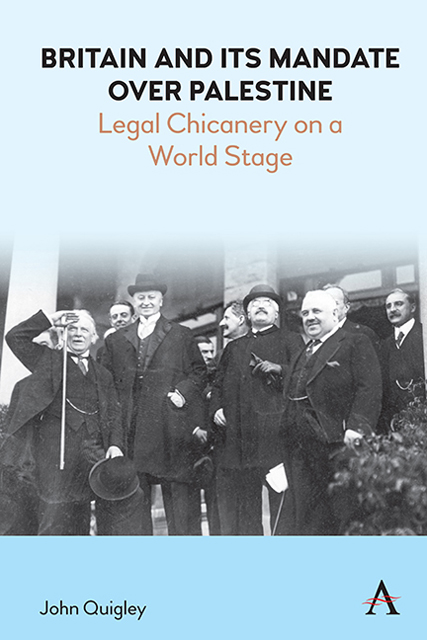Book contents
- Frontmatter
- Contents
- Preface
- Setting the Stage: Was Britain’s Rule in Palestine Legal?
- 1 The Balfour Declaration Is the Focal Point for the Legal Situation of Palestine
- 2 The Balfour Declaration Was a Binding Commitment to the Jewish People
- 3 The Jewish National Home Meant a Jewish State
- 4 The Balfour Declaration Was Issued to Affirm Jewish Rights in Palestine
- 5 The Paris Peace Conference Raised Jewish Statehood to the International Level
- 6 Britain’s Allies Made the Balfour Declaration an International Commitment
- 7 Britain’s Allies Endorsed Jewish Rights
- 8 Britain Took on Palestine Because of the League’s Mandate System
- 9 The League of Nations Protected Palestine’s Arab Population
- 10 Britain Was Given Palestine by the League of Nations
- 11 The League of Nations Put the Palestine Mandate into Legal Force
- 12 The Peace Treaty with Turkey Legalized Britain’s Status in Palestine
- 13 The Palestine Mandate Document Was a Treaty between Britain and the League
- 14 The League of Nations Required Britain to Implement the Balfour Declaration
- 15 The Palestine Mandate Document Implemented the League Covenant
- 16 The Palestine Mandate Document Recognized Jews as a National Group
- 17 The Palestine Mandate Document Bound Britain to the Balfour Declaration
- 18 The International Community Committed Itself to the Balfour Declaration
- 19 Britain Held Legal Status in Palestine
- 20 The United Nations Charter Carried Forward a Jewish Entitlement to Statehood
- Postscript: Why History Matters
- Documents Annex
- Notes
- Bibliography
- Index
20 - The United Nations Charter Carried Forward a Jewish Entitlement to Statehood
Published online by Cambridge University Press: 10 January 2023
- Frontmatter
- Contents
- Preface
- Setting the Stage: Was Britain’s Rule in Palestine Legal?
- 1 The Balfour Declaration Is the Focal Point for the Legal Situation of Palestine
- 2 The Balfour Declaration Was a Binding Commitment to the Jewish People
- 3 The Jewish National Home Meant a Jewish State
- 4 The Balfour Declaration Was Issued to Affirm Jewish Rights in Palestine
- 5 The Paris Peace Conference Raised Jewish Statehood to the International Level
- 6 Britain’s Allies Made the Balfour Declaration an International Commitment
- 7 Britain’s Allies Endorsed Jewish Rights
- 8 Britain Took on Palestine Because of the League’s Mandate System
- 9 The League of Nations Protected Palestine’s Arab Population
- 10 Britain Was Given Palestine by the League of Nations
- 11 The League of Nations Put the Palestine Mandate into Legal Force
- 12 The Peace Treaty with Turkey Legalized Britain’s Status in Palestine
- 13 The Palestine Mandate Document Was a Treaty between Britain and the League
- 14 The League of Nations Required Britain to Implement the Balfour Declaration
- 15 The Palestine Mandate Document Implemented the League Covenant
- 16 The Palestine Mandate Document Recognized Jews as a National Group
- 17 The Palestine Mandate Document Bound Britain to the Balfour Declaration
- 18 The International Community Committed Itself to the Balfour Declaration
- 19 Britain Held Legal Status in Palestine
- 20 The United Nations Charter Carried Forward a Jewish Entitlement to Statehood
- Postscript: Why History Matters
- Documents Annex
- Notes
- Bibliography
- Index
Summary
The demise of the League of Nations cast even more doubt on the status of Britain in Palestine. The League Council did not meet after 1940. Nor did the Permanent Mandates Commission. The League itself was formally dissolved by the League Assembly in 1946. If Britain's position in Palestine derived from the League, the extinction of the League might have meant extinction of Britain's role in Palestine. If the Palestine mandate document was a treaty between the League and Britain, the League's disappearance would deprive it of whatever legal force it might have had, since one of the two supposed parties no longer existed. Members of the League were concerned about the fate of those mandate territories that had not achieved independence. They addressed the issue as the Assembly closed the League down at its last session. Mandatories were asked to continue to administer until other arrangements were made. Egypt objected. “It is the view of my Government,” Egypt's delegate told the Assembly, “that mandates have terminated with the dissolution of the League of Nations.” Several mandatories indicated, however, that they planned to continue to administer at least temporarily on the basis of the existing mandates. Britain, as we saw in Chapter 13, purported to govern under the mandate until 1948.
The demise of the League, nevertheless, deprived both Britain and the Zionist Organization and its affiliate Jewish Agency of institutional backing for the Palestine mandate. If it could be shown that the Palestine mandate document was accepted by the United Nations, the rights the Jewish people supposedly had under it could be seen as continuing to be accepted even after the termination by Britain of the mandate.
This theory was spelled out by Paul S. Riebenfeld, who had represented the Jewish Agency before the Permanent Mandates Commission. Noting the liquidation of the League of Nations, Riebenfeld claimed, “The continued validity, however, of rights derived from a Mandate after the expiry of the League and the Mandate system was spelled out in the Charter of the United Nations, in its Article 80.” Riebenfeld quoted from Article 80 the phrase relating to the rights of “any peoples or the terms of existing international instruments to which Members of the United Nations may respectively be parties.”
- Type
- Chapter
- Information
- Britain and its Mandate over PalestineLegal Chicanery on a World Stage, pp. 145 - 148Publisher: Anthem PressPrint publication year: 2022

